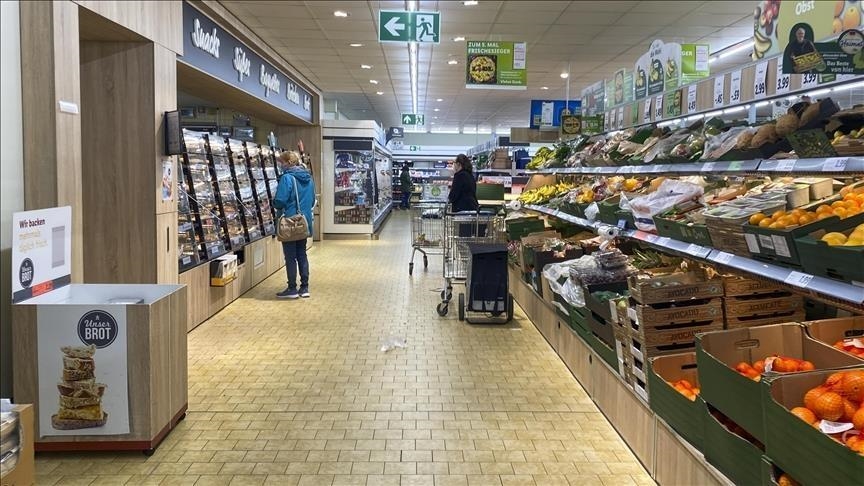
OVIEDO, Spain
Spain is known as Europe's garden because it is one of the continent's leading food producers and suppliers.
In 2021, it exported €60 billion ($59 billion) worth of fruit, olive oil, vegetables, wine, meat, and cheese around the globe.
But even Spain's relative self-sufficiency has been no match for inflationary forces. A survey by the consumer organization OCU of a basket of essential goods at 1,180 supermarkets around the country recorded prices rising an average of 15.2% over the last year, the highest annual rise in 34 years.
Like other countries worldwide, skyrocketing commodity prices, exacerbated by the war in Ukraine, have been fueling the cost of living crisis.
Spanish farmers have had to cope with a 77% spike in energy prices and a 36% surge in the cost of fertilizer, according to the Murcian agricultural association Proexport. For livestock farmers, the cost of animal feed went up by an average of 47%, according to the Spanish farmers’ union UPA.
At the same time, the hottest summer on record wreaked havoc on Spanish crops this year. Not only did the blazing sun dry out Spanish fields, but it triggered a historic wildfire season that scorched three times more land than average. Drought was the other word of the season. In September, Spain's water reserves dropped to their lowest levels in nearly three decades.
Exemplifying the harsh growing conditions, this year, Spain's olive oil production is expected to plummet 33% below average, according to a leading agricultural cooperative in the Andalusia region.
Meanwhile, the Spanish consumer organization FACUA has accused supermarket chains of making the situation worse by manipulating prices to boost their margins.
"Some of them are taking advantage of the situation. They see that there is real inflation, but since people are expecting prices to rise, instead of increasing prices by what's justified like 2% or 5%, they go ahead and raise prices by 10%, 15% or 80%," the organization's Secretary-General Ruben Sanchez told the Spanish broadcaster TVE.
"It isn't a free market competition, it's the freedom to drive people into poverty."
Fernando Agusto, a butcher who sells meat that comes directly from his own farm in the northern region of Asturias, agrees that many of the price hikes have been exaggerated. He told Anadolu Agency that his customers pay no more than they did one year ago because he doesn't have to deal with intermediaries.
Outsized impact on the most vulnerable
For most of Spain's population, the increasing price of food is a burden they can bear. Yet the cost of living crisis is making life significantly more challenging for the estimated 13.1 million residents of Spain -- 28% of the population -- at risk of or experiencing poverty. According to Oxfam in Spain, inflation impacts the purchasing power of the poorest households by 30% more than the richest.
"We're up to our necks. Everything is so expensive. … I don't even want to think about (what will happen this winter). It's terribly frightening," Covadonga Rollo, a senior citizen in the Spanish city of Oviedo, told Anadolu Agency.
Food banks say it's a perfect storm. More and more people need help to put food on the table, but people are donating less food. It is also becoming more expensive for charities to buy food to serve those in need. In the northern Spanish region of Galicia, NGOs like Caritas say their costs are up 40% from a year ago.
Some small vendors say they are taking an outsized hit from soaring inflation.
"Since we buy fewer products than supermarkets, we can't compete in price. … It affects us because people aren't buying as much as they used to," Ana Fernandez, the owner of a fruit shop in the picturesque central market of Oviedo, told Anadolu Agency. "And I have to pay more for gas and electricity — everything is more expensive."
Price caps on healthy staples
The rising cost of food has also been a thorn in the side of Spain's government ahead of an election year in 2023. Made up of a coalition between the Socialist Party and Unidas Podemos, on paper, this is the most left-wing government the country has had since the death of Francisco Franco.
"The duty of any progressive government should be protecting the purchasing power of working families, and we're working on it," said Spain's Consumer Affairs Minister Alberto Garzon in September.
Garzon and Spanish Labor Minister Yolanda Diaz have shared their plan to tackle food prices. It consists of agreeing with major food distributors like supermarket chains to put price caps on dozens of healthy food staples to "moderate and freeze prices" for Spanish consumers. The ministers say they are continuing talks with Spain's food industry representatives. But so far, a deal seems far off.
After meeting with the ministers to discuss the plan for price caps, three major food distributor associations released a joint statement saying the idea is "unfeasible and counterproductive."
Instead, the supermarket and distributor associations ACES, ANGED, and ASEDAS are asking the government to decrease sales tax on food, temporarily suspend environmental taxes, and lower energy prices for the entire agricultural chain. They say the price increases are clearly caused by high commodity prices and argue that food distributors' margins are already "highly reduced" and cannot be squeezed any further.
Anadolu Agency website contains only a portion of the news stories offered to subscribers in the AA News Broadcasting System (HAS), and in summarized form. Please contact us for subscription options.







